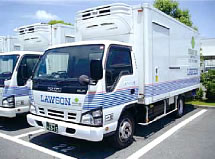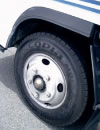SUSTAINABILITY Carbon-free Initiatives
More Efficient Distribution
Lawson seeks to reduce the environmental burden by implementing an efficient nationwide distribution network and introducing eco-friendly vehicles and facilities.
We will promote various initiatives with the aim of reducing CO2 emissions from delivery vehicles per store by 50% by 2030 compared to the 2013 level.

Optimizing Delivery Frequency
We use dual cabin two-temperature controlled vehicles, which carry products managed at different temperatures, such as temperature-controlled products and chilled products,* in a single delivery vehicle with a partition, thereby reducing vehicles that deliver to stores.
Furthermore, starting in December 2023, in order to comply with the work-style reform laws that came into effect in April 2024 and to reduce CO2 emissions, we have been switching the number of deliveries of chilled and temperature-controlled products, such as lunch boxes, prepared foods, and desserts, from three to two times a day. Through these initiatives, the average number of vehicles delivering per store per day has been reduced from 16 in FY 1989 to 5.0 (excluding newspapers, books, magazines, and tobacco).
* Chilled products: Rice dishes, dairy products, desserts and other items that must be kept refrigerated.
- Average Daily Deliveries Per Store

Promoting Optimization of Store Delivery Diagrams Using AI
Lawson has been promoting efforts to reduce CO2 emissions by optimizing store delivery diagrams created using AI. Since October 2021, we have been carrying out deliveries from a temperature-controlled and chilled distribution center in Gumma Prefecture to about 400 stores in its jurisdiction using store delivery diagrams created with AI. The AI analyzes routes that minimize CO2 emissions and delivery costs from a combination of stores in multiple directions.
Eco-Tires and Traffic Control System
- Eco-Tires
- Thanks to innovations in tire shape and rubber composition, eco-tires help reduce energy loss (rolling resistance) during use and thus reduce fuel consumption. The use of eco-tires is estimated to improve per-vehicle fuel efficiency by about 4%.
- Traffic Control System
- This system provides real-time information about the temperature of goods during transportation as well as about arrivals and deliveries, enabling more robust quality control. It also provides data on the ways trucks are being driven, including rapid acceleration and braking as well as speeding. We use this information to promote more efficient driving and to help prevent unnecessary idling.

Delivery truck

Eco-tire
Eco-Friendly Driving

Awarding ceremony of recognition for eco-friendly drivers
We train drivers to always avoid unnecessary idling and noise. Seeking to raise driver awareness, we also have a awarding system of recognition to logistics contractors that promote eco-friendly driving.
Biodiesel fuel produced from waste oil discharged from stores is used for delivery vehicles

In November 2023, a demonstrative trial was started at Lawson stores in Kumamoto Prefecture to collect and refine waste edible oil used for cooking fried foods, such as Kara-age Kun, and produce biodiesel fuel with a mixture ratio of 5% biofuel.
The produced biodiesel fuel is used as fuel for trucks that deliver chilled products to Lawson stores.
The trial was started with one truck, and as of the end of August 2024, two trucks are in use.
This initiative is expected to reduce CO2 emissions per delivery truck by approximately 2.33 tons per year.
A Trial of a Hydrogen-powered Fuel Cell FC Light-duty Trucks

In July 2021, we started a trial of a hydrogen-fueled fuel cell light-duty truck at our distribution center in Ota Ward, Tokyo, with the aim of contributing to creating a sustainable society that responds to the need to curb global warming and diversify energy sources. A pilot test using this truck was conducted to deliver boxed meals and rice balls to approximately 20 Lawson stores in Tokyo.
Furthermore, we started to use hydrogen-fueled fuel cell light-duty trucks jointly developed by Toyota Motor Corporation and Isuzu Motors Limited. In May 2023, we introduced one truck each at our distribution centers in Fukushima Prefecture and Tokyo. We will be making efforts to reduce our CO2 emissions from delivery by gradually expanding the areas where fuel cell light-duty trucks are used to deliver products.
